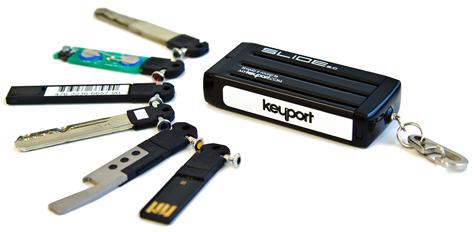Keyport Slide

Best house- and car-key consolidator
I’ve tried using many key consolidation gadgets, including DIY to many indy projects, but most of them involve driving a screw or rod through the hole in the keys, and jamming them together via compression. If your goal is to simply have 10+ keys in your possession in the most compact way possible, that’s great, but I’ve found most of them to be quite unusable, in that it’s difficult for the correct key to be selected due to the lateral compression.
The KeyPort Slide 2.0 is the only product on the market that I know of that does all the following: consolidates your keys in a compact form that saves weight, relies on a locking and sliding action for ease of key retrieval/use, can incorporate your microchipped car key, and actually makes it easier for you to use your keys.
The KeyPort is small and lightweight. Even fully populated, it weighs around 1.5oz, and its size is 2.85″ x 1.27″ x 0.58″, and can fit in your jeans’ front coin pocket. The body is polycarbonate with Ultem 1000 polymer caps, which works out to be OK, as the rigidity of the structure depends on the key blades to some extent, though fans of anodized and brushed metals will be disappointed. Unfortunately, this compact size only allows for up to 6 keys, but again, the concept is around usability, not maximum capacity. (If your budget allows for it, you could buy 2.)
The KeyPort uses custom key “blades” instead of standard keys. This means that the large, heavy area where you hold the key and pass keyrings through is gone, greatly reducing weight. However, this means that you either buy $5 blanks and have them cut locally, or if it’s a custom key, send it in to have it converted. You’ll want to find a locksmith that is OK with handling these custom blades using their locksmith locator.
The KeyPort supports high security keys like Medeco, Assa, and Mul-T-Lock by converting them into blades for you. This is a unique service, and allows you to carry these otherwise gigantic keys in a compact format. The downside is that because high security keys cannot be duplicated, you must send the keys into KeyPort for conversion, which could violate your personal and/or professional security policies.
It’s worth noting that if you don’t want to send in your chipped auto key to be converted, your cost will skyrocket, because chipped auto keys usually cost quite a fortune. Your costs may vary, but the pricing I got was $25 for the blank auto blade, $25 for cutting an auto key, $150 for a new transponder, and $75 for programming it. That’s an additional $200! If you have a car key with a transponder, you can send in your spare, non-keyfob (likely valet) key and have them take it apart and convert it into a blade + transponder holder. (yes, a transponder holder uses up 1 slot). Unfortunately, due to liability reasons, they are unwilling to convert your car key if it is part of a keyfob. This was a bit of a bummer for me, as I actually had 2 keyfobs and 1 valet key, and did not care to give up my valet key, as I have to valet my car once in a while. However, they can send you a blank auto blade and transponder blade, so I had the key cut locally ($35; your costs may vary), and I harvested the transponder out of the the keyfob and superglued it into the transponder blade myself.
My setup includes a car key + car key transponder holder ($25), mini flashlight ($10), and 3 house keys ($5/ea). Such a setup would typically cost around $90, including local key cutting fees. Other options include a bottle opener ($6), 32GB USB drive ($40), and a barcode insert ($4) as well as custom buttons (price varies). My only gripe is that the locking buttons stick out a bit, and don’t require too much pressure to depress, so on occasion, I’ve found my keys unlocked. This is not a huge deal, but will drain your mini flashlight if you choose that option.
I didn’t order the bottle opener, as my pocket knife has one, and in general, I rarely need one. The transponder holder is actually a barcode insert, so I didn’t need another one. The mini flashlight was purchased with the hopes that I wouldn’t have to use another hand to pull out a flashlight, and for the most part, it’s worked out, but I’ve had it unintentionally turn on in my pocket a few times, and the batteries are not user-serviceable — you have to send it in to have it serviced for a nominal fee (~$5), though you could solder them if you know what you’re doing. The 32GB USB flash drive was appealing, but it seemed overpriced, and other reviews lamented over it somewhat slow (~20MB/sec) even for a USB 2.0 flash drive. For the same price, I was able to buy a 128GB USB 3.0 PNY flash drive that does 100MB/sec read/write, so with that big of a difference, I think it’s worth carrying another device.
Having the bundle of keys disappear from my pocket has been great. Surprisingly, being able to access my keys faster has been an even greater feature. Even with the high costs involved, I would do it again in a heartbeat.
A lot of questions about the Keyport are answered on their FAQ.
12/25/14Keyport Slide 2 Price depends on configuration






